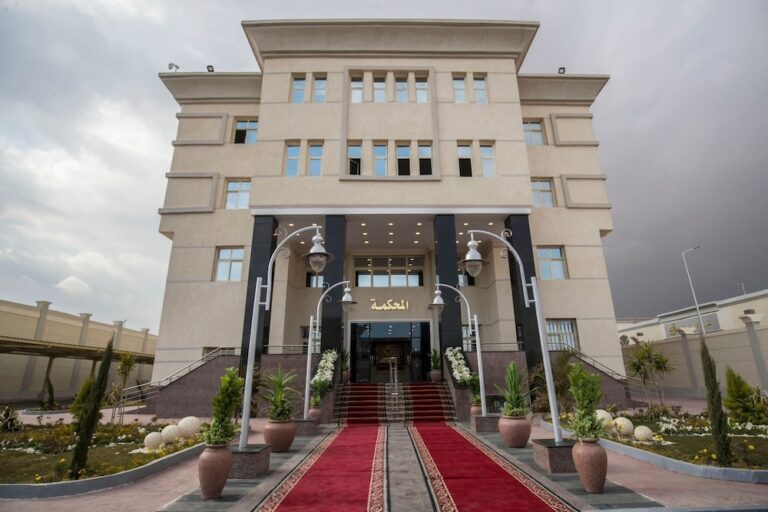Reporters in Egypt claim the government is confiscating press cards and other types of identification and are asking journalists to go to the Ministry of Information to apply for new temporary credentials.
(CPJ/IFEX) – New York, February 7, 2011 – Egyptian authorities have shifted their strategy for obstructing the press as protests enter their 14th day: The military has become the predominant force detaining journalists and confiscating their equipment rather than plainclothes police or government supporters, the Committee to Protect Journalists said today. Authorities have also put in place new bureaucratic obstacles for journalists covering the anti-Mubarak protests on Tahrir Square, with the military instructing reporters to seek new press credentials from the government.
“We hold the Egyptian military directly responsible for ongoing systematic efforts to restrict the work of journalists and for the mistreatment of journalists who have been taken into custody,” said Mohamed Abdel Dayem, CPJ’s Middle East and North Africa program coordinator. “We call on the Egyptian military and the government to respect the work of the press, release any journalist in custody, and immediately investigate allegations of abuse and mistreatment.”
Foreign editors in the U.S. as well as reporters in Egypt have told CPJ that the government is confiscating press cards and other types of identification and are asking journalists to go to the Ministry of Information to apply for new temporary credentials. Multiple journalists told CPJ that they have been told to acquire accreditation from the government, including one who said he was told the same thing by the U.S. Embassy in Cairo. (CPJ was unable to reach the embassy to confirm.)
“The sudden change in policy regarding press credentials is simply the latest effort to restrict the work of journalists, many of whom have already been beaten by mobs and detained by authorities,” added Joel Simon, CPJ executive director.
Local journalists told CPJ that the military is obstructing journalists and refusing many entry into Tahrir Square. Al-Jazeera reported on the air that “individuals who have cameras or food are often prevented from reaching the square.”
Journalists are also reporting that they have been mistreated while in custody. Here are some firsthand accounts, and a roundup of new attacks on the press:
• Bloggers and lawyers told CPJ that authorities detained Abdel Karim Suleiman-known online as Karim Amer-at some point in the early morning hours in Cairo today. Amer completed a four-year prison sentence on charges of insulting Islam and President Hosni Mubarak in late 2010.
• Radio Free Europe/Radio Liberty reporters Robert Tait and Abdelilah Nuaimi, both British citizens, were released on Sunday and left Egypt, according to a statement released by the U.S. government-funded RFE/RL. The journalists were detained on February 4. Tait was reported as saying that “whatever official statements you might hear about the situation of detained journalists, we were not treated well.”
• Journalists Souad Mekhennet and Nicholas Kulish, who were detained on Thursday and released 24 hours later, wrote in the New York Times about intimidation and mistreatment by the plainclothes officers who held them. “We felt powerless-uncertain about where and how long we would be held. But the worst part had nothing to do with our treatment. It was seeing-and in particular hearing through the walls of this dreadful facility-the abuse of Egyptians at the hands of their own government.” They added, “Many journalists shared this experience, and many were kept in worse conditions-some suffering from injuries as well.”
• Military authorities detained Al-Jazeera English correspondent Ayman Mohyeldin in Tahrir Square for nine hours on Sunday, according to the network. “It was just the mere fact that I was a journalist who was trying to go into Liberation Square that seemed to be enough for them to take me for further questioning,” Mohyeldin told Al-Jazeera.
• Sherine Tadros, an Al-Jazeera English correspondent, was held at a military checkpoint on Sunday, but released within an hour, according to news reports.
• Liam Stack, who has been stringing for the New York Times, was also briefly detained on Sunday and tweeted that authorities confiscated his camera.
• Marion Touboul, a French journalist living in Cairo, told the independent daily Al-Masri al-Youm that she was arrested on Saturday while trying to return home. “I was not working, and I had no camera on me, but a sinister-looking guy asked to see my ID and answered my phone. He said to my boyfriend, who was on the line, that I was hurt, so he would get there quickly. We both got arrested,” she recounted. She added that both were blindfolded and taken by military police to Nasr City, a Cairo neighborhood. They were held for eight hours before being released. “We were not brutalized at all. This was clearly intimidation,” said Touboul, who works for the Franco-German broadcaster Arte.
• On Friday, plainclothes security forces stormed the offices of Ikhwan Online, a news website associated with the Muslim Brotherhood, according to news reports. Twelve journalists were detained and taken to the Ministry of Interior. Security forces, along with a pro-Mubarak mob, searched the news website’s offices, confiscating some 30 computers and various notes and documents, according to Ahmad Subai, a journalist at the website. Six of the journalists were released late on Friday. This came after similar attacks in recent days against the offices of other independent dailies and weeklies, like Al-Shorouk and Al-Badil.
• Also on Friday, Amira Ahmed, business editor at The Daily News Egypt, was attacked by a pro-Mubarak mob, according to news reports. “It was terrifying,” Ahmed told the Guardian. “They were chanting: ‘We’ve found the foreigners, don’t let them go,’ and calling us traitors and spies. When I pointed out to them that I was Egyptian, they responded: ‘Your Egypt isn’t the same as ours.'”
In all, CPJ has documented at least 140 direct attacks on journalists and news facilities since January 30, and is investigating numerous other reports.


